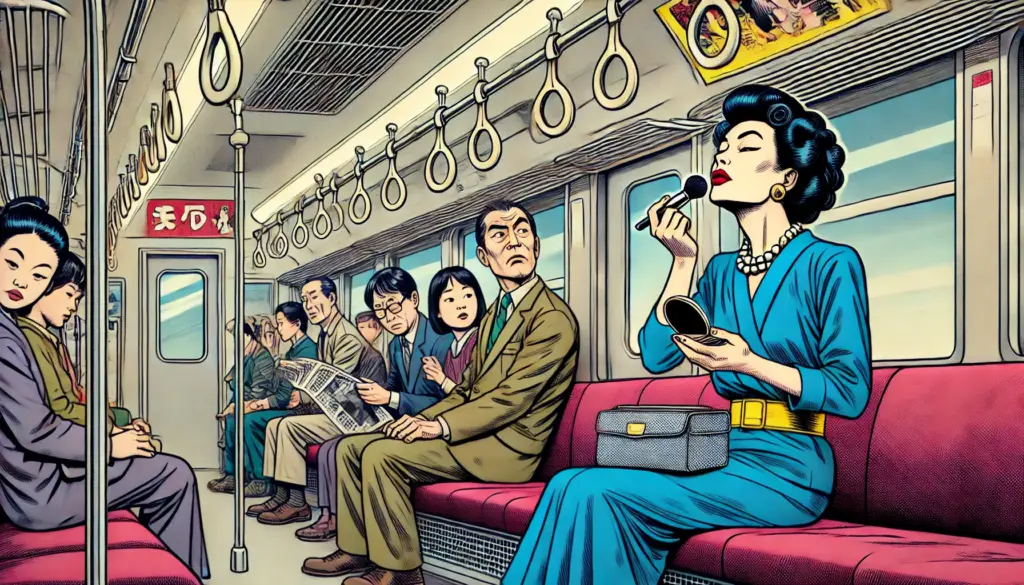
In Japan, applying makeup on public transport is one of those everyday actions that sparks surprising levels of debate. Some see it as an unforgivable breach of manners, while others argue that the real problem is not the act itself, but the cultural expectation that women must always be “presentable.”
Let’s dive into both sides of the story—because this is about far more than eyeliner and lipstick.
1. The Long-Standing Etiquette Debate
Many people in Japan see public makeup as poor manners. The train is considered a shared space where one should behave with discretion and avoid actions that draw attention. Applying makeup—especially full makeup routines—can feel to some like turning a carriage into a private dressing room.
In Japanese etiquette culture, there’s an unspoken rule: personal grooming should be done at home or in private spaces, not in front of strangers. This mindset is deeply tied to the value placed on modesty and on keeping public life and private life distinct.
2. Generational Differences
Interestingly, opinions vary widely across generations.
Older commuters, especially older women, tend to strongly disapprove, seeing the act as unrefined. They often frame it as a lack of respect for others.
Younger commuters, on the other hand, are more likely to shrug it off, seeing it as a practical solution to time constraints.
This generational divide reflects broader cultural shifts in Japan—where rigid etiquette is gradually being challenged by lifestyles that demand multitasking.
3. Practical Concerns Beyond Manners
Critics often cite specific, tangible risks:
- Accidental mess – Powder, mascara, or lipstick can easily transfer onto someone else’s clothing in crowded trains.
- Safety hazards – Sudden stops can cause injury, such as poking an eye with an eyeliner pencil.
- Allergy risks – Scented or aerosol products may bother fellow passengers with sensitivities.
- Intrusion on mental space – Many commuters value a quiet, neutral environment, and watching someone’s grooming process can feel intrusive.
These concerns are not just about appearances—they touch on health, safety, and comfort.
4. The Deeper Issue: Pressure to Wear Makeup
What complicates the conversation is that for many women, makeup is not a choice—it’s a social obligation.
Workplaces often expect female employees to wear at least “natural makeup” to look professional. In customer-facing jobs, appearing without makeup can be judged as careless or unkempt. Even outside of work, social norms suggest that women should always aim to look “polished.”
This pressure is so ingrained that many women apply makeup not for self-expression, but to meet unspoken standards. For those with long commutes and tight schedules, doing makeup on the train can feel like the only option.
5. Students and Young Commuters
For younger people, especially high school and university students, public makeup often serves as emotional armor. Arriving barefaced can feel more embarrassing than putting on makeup in a carriage. In peer-driven environments, fitting in visually can be just as important as academic performance.
Here, the makeup debate intersects with broader issues of self-esteem and identity formation.
6. How Foreigners in Japan View It
Foreign residents in Japan have mixed opinions.
Some are unfazed, noting that in their home countries, public grooming isn’t considered a big deal as long as it doesn’t inconvenience others.
Others side with traditional Japanese etiquette, saying makeup should be done in a restroom or at home.
These differences often reflect cultural norms in each country, and how much privacy is valued in public spaces.
7. A Balanced Perspective
It’s easy to dismiss makeup on trains as simply rude, but that ignores the structural issues behind it. If society expects women to wear makeup daily, then some will inevitably resort to doing it on the go.
A more balanced approach could include:
- Being considerate – Avoid applying makeup when the train is crowded, and skip products that spread particles or strong scents.
- Minimal touch-ups – Use the commute for quick fixes rather than full applications.
- Cultural shift – Reduce the pressure for women to always appear made-up, especially in workplaces and schools.
8. The Bigger Question
Maybe the real question isn’t “Is makeup on trains rude?” but “Why do so many people feel they must wear makeup at all times?”
When society begins to value people for their work, character, and comfort rather than their adherence to beauty norms, debates like this may fade naturally.
Summary Table
| Question | Insight |
|---|---|
| Is it rude? | Often seen as impolite, especially by older generations. |
| Why do it anyway? | Time pressure, long commutes, societal expectations. |
| Main objections? | Safety, hygiene, intrusion on shared space. |
| Root issue? | Cultural pressure on women to always wear makeup. |
| Way forward? | Consideration + challenging beauty norms. |



















































